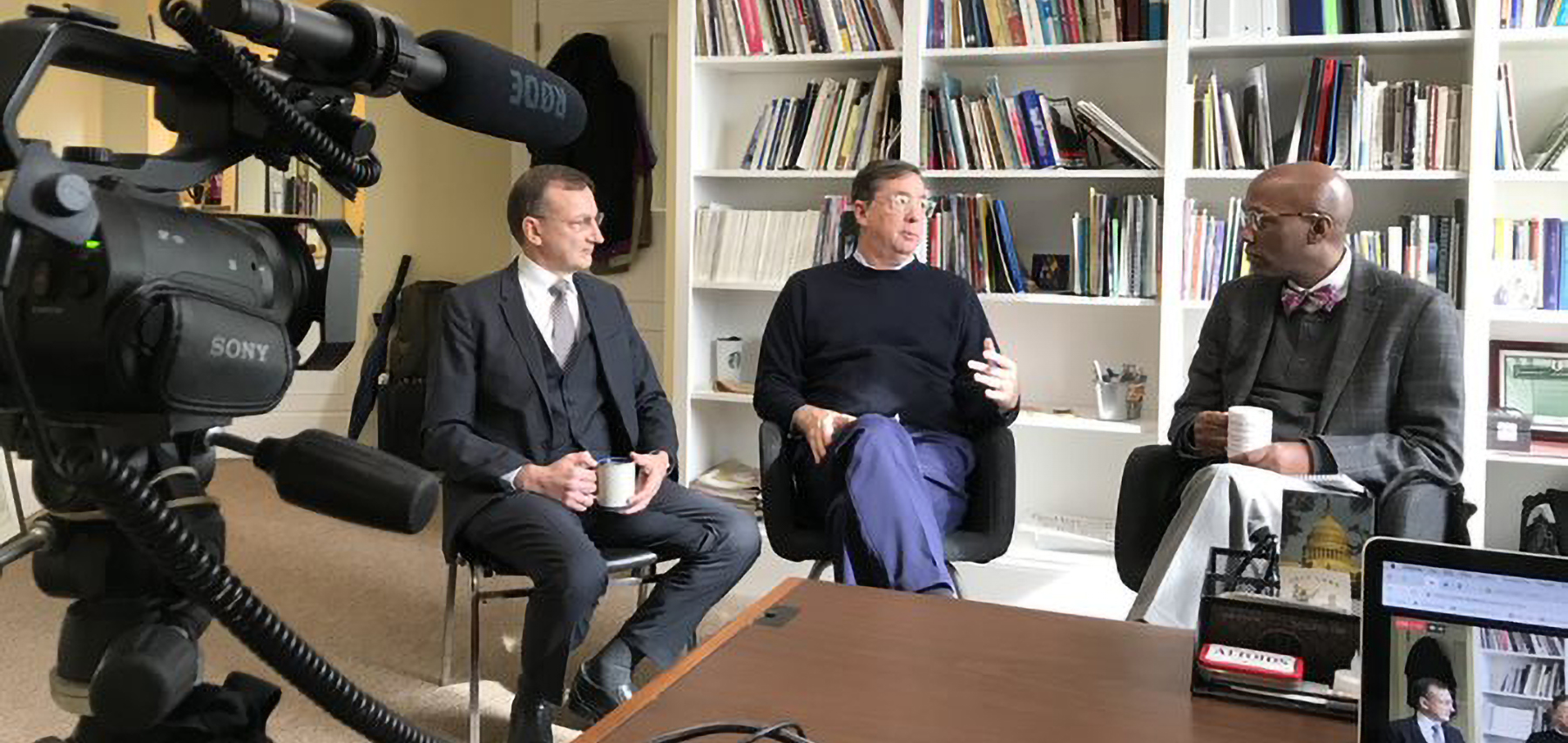
(Left to Right) Dr. Peter Prove, with the World Council of Churches, and Jim Winkler, National Council of Churches, joined the Rev. Dr. J. Herbert Nelson, II, for the Facebook Live broadcast of Coffee with the Clerk in Washington, D.C. this week. Photo by Randy Hobson.
Representatives from the World Council of Churches and the National Council of Churches are urging faith groups to engage with their political leaders. Jim Winkler, president of the national council, and Dr. Peter Prove, executive director of the WCC Commission of the Churches on International Affairs, appeared Monday on Coffee with the Clerk, a weekly Facebook Live broadcast with the Rev. Dr. J. Herbert Nelson, II, Stated Clerk of the Presbyterian Church (U.S.A.).
Winkler and Prove joined Nelson in Washington, D.C., to discuss the impact of the recent election results and discuss the role of various faiths in the work on Capitol Hill. Prove and Winkler say efforts to speak with members of the Trump administration have not been easy.
“Churches making up the National Council have not had access to the highest levels of government these last couple of years,” Winkler said. “President Obama welcomed everyone whether he agreed with them or not. That doesn’t mean churches had influence, but there was ready access to the government. The past two years have been challenging for many of us who have offices on Capitol Hill.”
Winkler says various faith groups have been hampered and unable to fully express their concerns about what is happening around the world.
“We have working groups on a number of issues, including human needs, drones, health care. It’s quite an advanced and sophisticated infrastructure,” he said. “It’s not just Christians, but other faith groups, including Hindus, Muslims, Jews, Buddhists, all working on every issue and trying to speak on behalf of the least, the last and the lost and to improve the situation for people in the U.S. and work for peace and justice around the world.”
Winkler says the National Council of Churches will be trying to determine what the recent election results mean for all faith groups working with Republicans and Democrats on issues such as mass incarceration, education, health care and climate change. “One thing I’m sure of — the faith community will continue to work together in a coordinated manner to impact change in our nation.”
Both Winkler and Prove agree that most faith groups in the country are actively engaged in the public arena, adding that that will continue no matter who sits in the White House.
Prove, a Lutheran lawyer and international affairs expert from Australia, says he’s made numerous trips to the U.S. this year to keep dialogue open with government leaders.
“It’s a struggle because there is a certain narrow bandwidth of the faith community that has privileged access to government leaders. One doesn’t choose one’s allies — one has to work with the opportunities that are there,” he said. “Part of the reason I’m shuttling back and forth here is to build those relationships directly and indirectly.”
As a lawyer, Prove says he can’t relate to the idea that a church remains in a silo, isolated from the political environment.
“I can’t understand how the church can be salt, yeast and the light if they are in a silo and not expressing themselves based on the fundamental faith values in the context of where they live and work and minister,” he said. “I can’t imagine that.”
Prove says everything that relates to human relationships in the context of society is political by definition.
“It’s nonsensical to consider withdrawing from political life. If we are talking partisan politics, it’s a different matter,” Prove said. “If churches tie themselves to one party over another, there is a risk. Churches should be independent of partisan politics, but deeply engaged in politics.”
“Our congregations have the potential to be places where a great deal of productive, reasoned, calm conversation can take place,” said Winkler. “Some churches forgo that for fear that any conversation about social and political issues is divisive, and we have to get beyond that, because there’s no time to waste. We have unbelievable world-pressing problems that are weighing on us on a moment-by-moment basis.”
Coffee with the Clerk is broadcast on Facebook Live each Monday at 11 a.m. EST. Click here to see the entire conversation.
